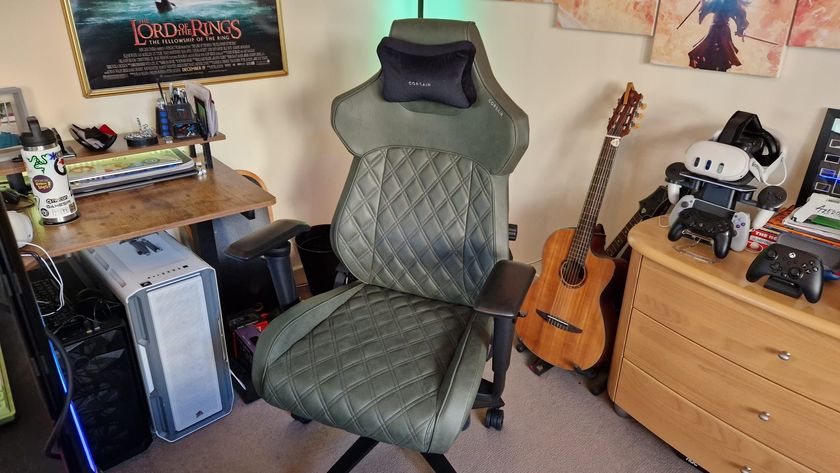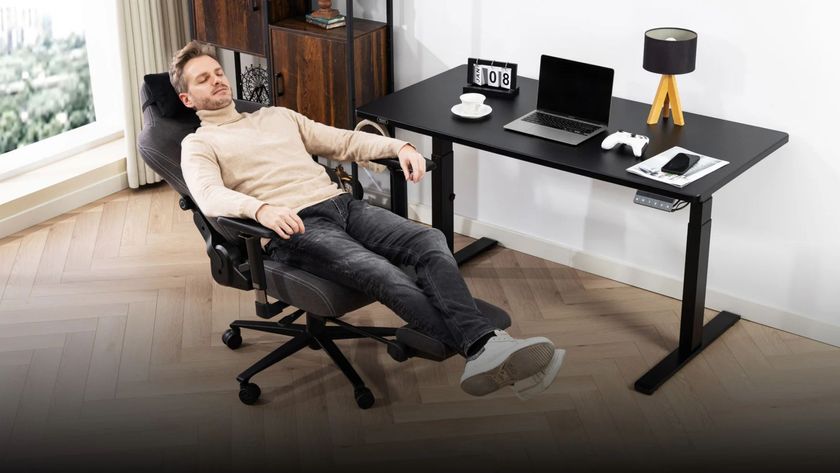Buying a projector: read our guide before you replace your TV
Making the leap from TV to a projector for games, TV, and film - is it worth it, and what should you think about?
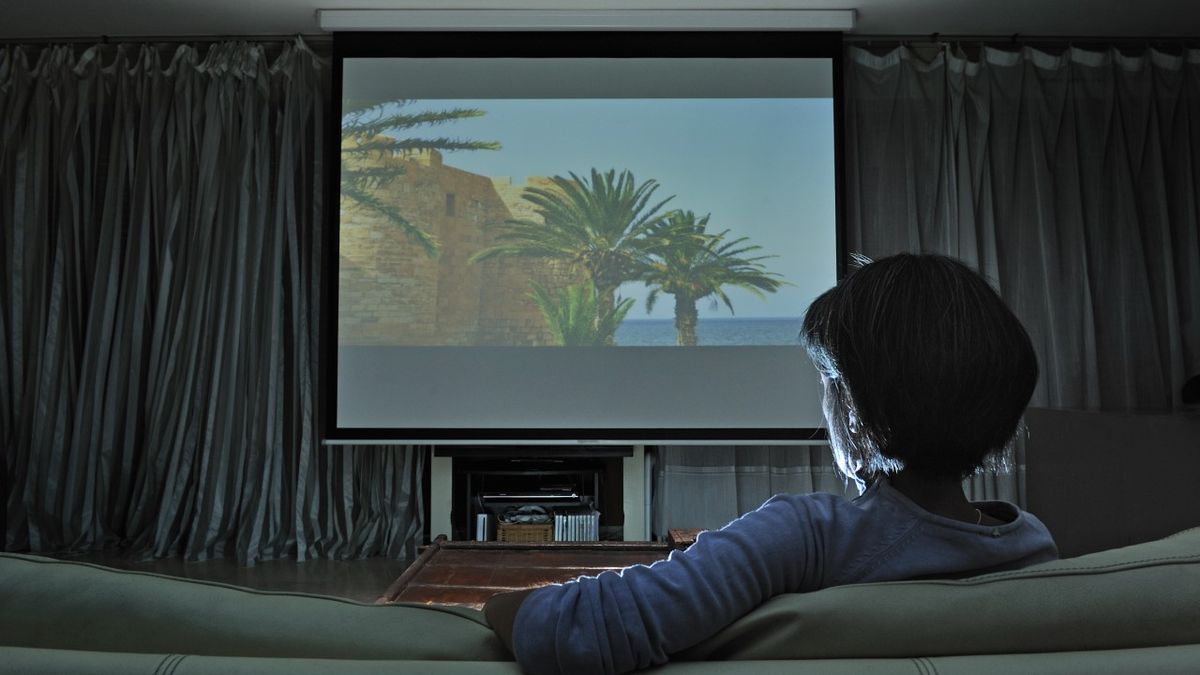
Getting one of the best projectors was as crucial for me as it is a TV for many others: the first thing I bought for my flat three years ago was an Optoma 1080p projector at about $550 / £500. My old TV moved with me but was never plugged in; I am now a full convert to the projector life.
I love settling down in front of a film, looking up to see the dust float in the light just like at the movies. I’ve had people round to play games where your split-screen window is bigger than one of the best gaming TVs or biggest 4K monitors for gaming. And I’ve had great times hosting watch parties for big wrestling events where everyone has been able to comfortably see the massive picture. If any of this sounds up your street, a home projector is for you.
However, there are a few things to think about when you’re thinking about buying your first projector. They may just be considerations, or they could be dealbreakers. If you've thought about moving away from gaming TVs, these thoughts will help you to understand whether you should buy a projector or not.
The room
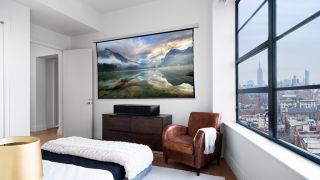
Before you even get to measurements, the main factor for projectors is light. If you live in an architectural triumph with floor to ceiling glass, you’ll struggle to use a projector before dusk. If the room has windows you’ll need blackout curtains during the day. Lumens is the key spec to look out for (and it’s worth reading reviews which test these ratings, particularly at lower prices). From what I've learned, 2,000 lumens is the minimum, 3,000 is preferable and will look better with ambient light. Remember to investigate the remote too – in the dark a backlight is a need, not a luxury. But, if you need a perfect picture at every hour or plan to watch a lot in the day, investing in a TV may be the better option.
You’ll also need a clear, and clean, white surface to project on. Painting the wall white will do, but if this isn’t in keeping with your décor, you’ll have to buy a screen. You can get freestanding units, ones you screw into the wall and pull down like a blind, or even a sheet you simply unfold and stick up, all of which are good options.
- US Cheap projector screens | Amazon US | Best Buy | Walmart | Staples
- UK Cheap projector screens | Amazon UK | Currys | Box | Staples
The position of the projector is a then big consideration. A good bracket to hold it in place and up high is best. A shelf behind the sofa is fine, but having it this low can cause problems: from experience, you might need to crawl to avoid blocking the picture when your partner is on a tricky boss fight in the Final Fantasy VII remaster for instance!
You might be worried about not having a big enough room to be able to project a large image, but there are great short-throw projectors available - like the BenQ TH671ST - which will give a huge picture from as little as 3.5ft or one meter away, so you can still make a narrow room into a home cinema. What's more, the projector tech is of such a high quality nowadays, that you can find the best outdoor projectors will shine even in your garden or local park, whatever space you may or may not have at home.
Sign up to the GamesRadar+ Newsletter
Weekly digests, tales from the communities you love, and more
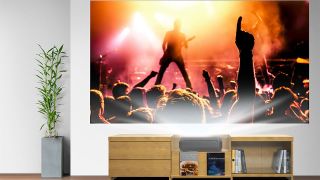
Connections, specs and features
Most home projectors have two HDMI inputs and one VGA port which gives easy connectivity to your device, be it one of the best gaming laptops, the best gaming PC, going, any of your consoles, and loads more. There’s also generally at least one powered USB port so you can stream directly from something like a PS4 external hard drive, an Amazon Fire or Ruku stick. The range of inputs can vary, so if you do have devices you want to use with different connections you should be able to find something which can cater to it.
Most projectors come with built-in speakers at around 5-10W, which are generally passable for casual use. But if this is going to be what you watch or play most things on, you’ll need a decent soundbar, gaming sound system, or set of some of the best computer speakers. It’s not an inconvenience particularly, especially if you already have speakers in place, but it could be another cost. Audio outputs are generally a single 3.5mm aux but some units offer more options. On the core of the visuals, projectors have great longevity as the bulbs should last well over five years before they need changing, even with heavy use.
If you’re a serious gamer you’ll need to check the input lag is under 40ms, and ideally closer to 20ms. A rate of 50ms or so is usually seen as acceptable by casual players, but that’s the point where lag can become noticeable, particularly on fast-paced shooters or sports games so, generally, you might be better off aiming for as low as possible still. Many units come with a setting optimized for gaming which reduces the input lag. It’s often worth reading reviews where the input lag is independently tested to ensure it meets the published specs. You won't find the screen tech and features of the best gaming monitors here, but modern home projectors can increasingly hold their own now.
Modern projectors are generally easy to set up. A quick adjustment of the zoom, focus, and keystoning (making sure the picture is square) and you’re away! Some projectors let you really get into the weeds of your set up if you want to, with some offering gaming modes like the TVs you might be considering too. However, you certainly don’t need to be an expert or even look at instructions to get great picture quality within minutes of unboxing.
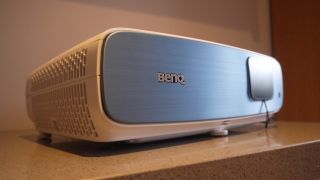
Pricing
When I was looking to buy a projector, the accepted advice was to avoid anything under about $400 / £300. But now, improvements in LED technology mean that there are relatively cheap units that will give great picture quality, although below Full HD and with lower levels of light. There are projectors for 100-200 dollars or pounds which are great for occasional use, or even a main unit if you can set up the perfect conditions.
For Full HD picture, you'll need to enter the 300-600 dollar/pound bracket. Brands like BenQ and Optoma have great units here which offer better value than some of the traditional big names in home electronics. If you simply have to have full 4K it’s going to be better to spend this money on a TV though. You’ll be looking at a 50” picture rather than 100”, but it will be sharper, and run some of the best 4K TVs under $500 very close on picture quality and general usage too.
And if you have to have a 4K image and can break four figures on a projector, you can get a great full native 4K picture (or at least faux-4K). If you are someone who is absolutely fixated on top of the line picture quality then you’re looking at going in at or above the four-figure mark, for sure. 4K projectors are becoming more affordable, but there is still a big leap in price between HD and 4K units.

All things considered
Buying your first projector needs more thought than just buying or upgrading a TV, but there is a good back and forth to have between the screen types.
You don’t simply pick the best picture quality, as you may have to redesign your living room! But this does not need to be overwhelming. The space may well already be well set up for a projector, or need only minor adjustments. If you do need to buy new curtains, speakers, and a pot of paint or screen, then the change to a projector is going to cost you more than just the unit itself though. But if you can make this work for your price point and think this is how you want to watch, play, and enjoy your media, then you just can’t beat a great projected image. Take the dive, and you'll enjoy the move to projected home cinema as much as I did.
Will is a freelance writer for a number of publications including GamesRadar, where he covers hardware reviews - with projectors being a particular point of interest. Along with his work for GamesRadar, his words can be found in the Orlando Sentinel. He's also a professional wrestler, enjoys running, and playing guitar.
Most Popular





